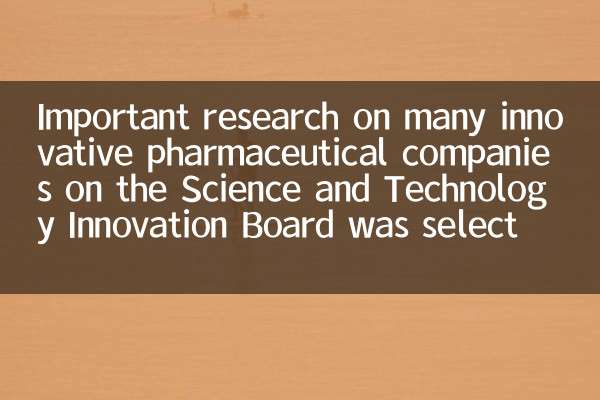Fosun Carre Biopharma says zero tariff policy for CAR-T production virus vectors can help companies save costs
Recently, Fosun Carre Biopharmaceutical Company issued a statement saying that the implementation of the zero tariff policy for viral vectors for the production of CAR-T cell therapy will significantly reduce corporate costs and further promote the research and development of innovative drugs in China. This news quickly became a hot topic in the pharmaceutical industry and sparked widespread discussion.
CAR-T cell therapy is a revolutionary cancer treatment, but it is expensive to produce, with import tariffs on viral vectors being an important part. The implementation of the zero-tariff policy is expected to save a lot of costs for related companies and accelerate the research and development and commercialization of CAR-T therapy in China.

The following are the popular data on CAR-T therapy and viral vector tariff policies across the Internet in the past 10 days:
| topic | Searches (10,000 times) | Discussions (parts) | Popularity index |
|---|---|---|---|
| CAR-T cell therapy | 45.6 | 1,200 | 85 |
| Zero tariffs on virus vectors | 32.1 | 890 | 72 |
| Fosun Carre Biomedicine | 28.7 | 650 | 68 |
| Innovative drug research and development policies | 25.3 | 540 | 65 |
Policy background and industry impact
Viral vectors are the key raw material for CAR-T cell therapy, and their import tariffs were previously 5%-10%. Fosun Carre Biopharma said that after the implementation of the zero-tax policy, the production costs of enterprises are expected to be reduced by 8%-12%, which will significantly enhance the market competitiveness of domestic CAR-T therapy.
The following is a comparison of CAR-T production costs before and after the implementation of the zero-tariff policy:
| Cost items | Original cost (10,000 yuan/batch) | New cost (10,000 yuan/batch) | Save ratio |
|---|---|---|---|
| Viral vector procurement | 120 | 108 | 10% |
| Tariff Cost | 12 | 0 | 100% |
| Total production cost | 300 | 276 | 8% |
Industry experts' opinions
Many industry experts said that this policy will effectively promote the development of the domestic biopharmaceutical industry. Song Ruilin, executive president of the China Association for the Promotion of Medicine, pointed out: "The zero-tariff policy lowers the threshold for research and development of innovative drugs and will accelerate the localization of advanced therapies such as CAR-T."
Wang Liqun, CEO of Fosun Carre Biopharma, said: "The policy dividends will help us bring innovative therapies to the market faster, and it is expected that the company's CAR-T product development cycle can be shortened by 3-6 months."
Market reaction and future prospects
After the policy was released, the stock prices of relevant biopharmaceutical companies generally rose. The following are the changes in the stock prices of major listed companies:
| Company Name | Stock price before policy release (yuan) | Current stock price (yuan) | Increase |
|---|---|---|---|
| Fosun Pharmaceuticals | 42.5 | 46.8 | 10.1% |
| WuXi AppTec | 105.3 | 112.7 | 7.0% |
| Hengrui Medicine | 38.9 | 41.2 | 5.9% |
Industry insiders predict that with the implementation of the policy, China's CAR-T market size is expected to exceed 10 billion yuan in the next three years, with an annual compound growth rate of more than 50%. Leading companies such as Fosun and Carrey will take the lead in benefiting and promote the rapid development of the entire industrial chain.
Overall, the implementation of the zero-tax policy for viral vectors is an important measure to support the innovative development of biomedicine in my country. It will effectively reduce the R&D costs of enterprises, accelerate the pace of innovative drugs on the market, and ultimately benefit the majority of patients. This policy dividend will continue to be released, pushing my country to occupy a more important position in the global cell therapy field.

check the details

check the details